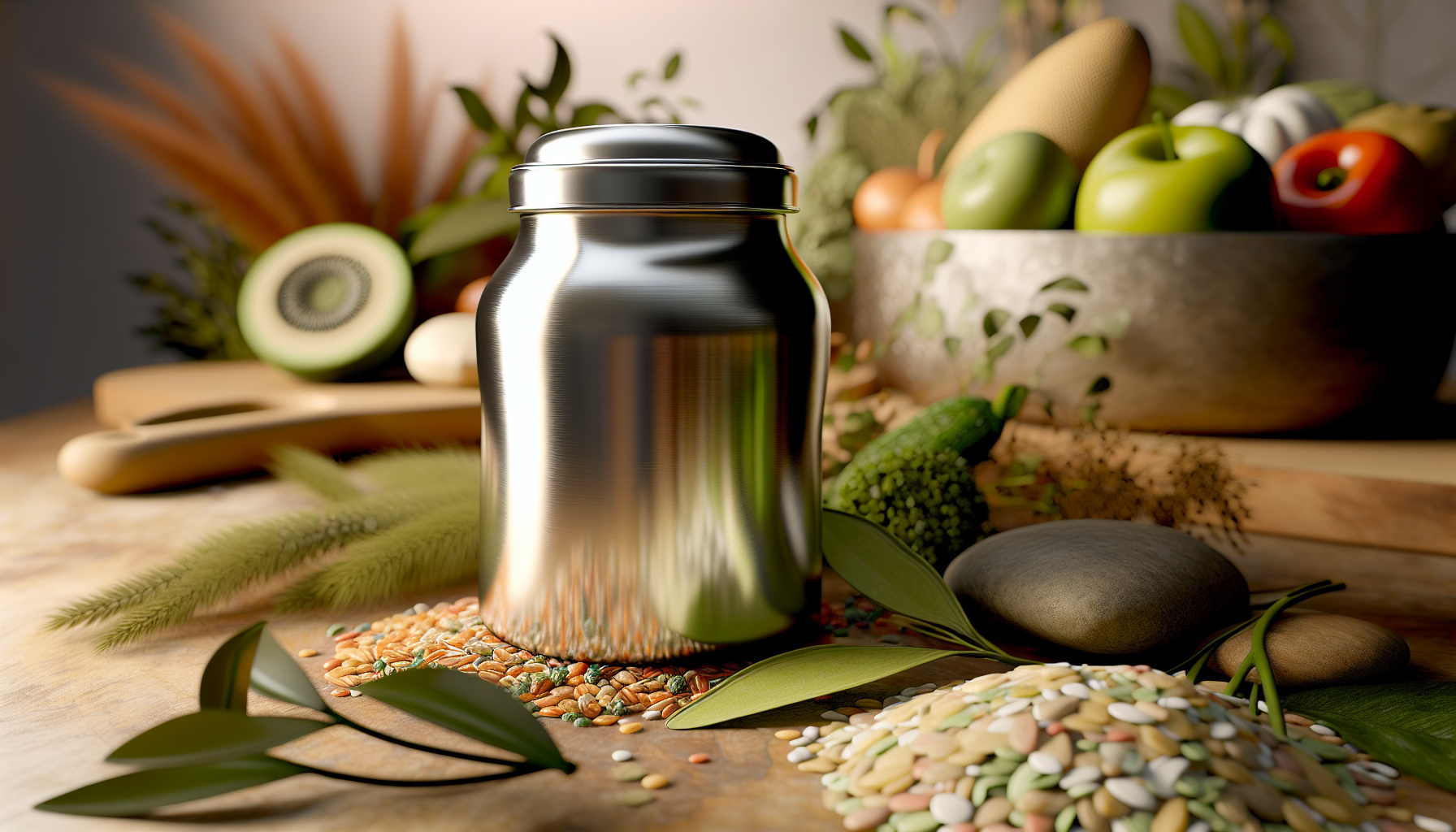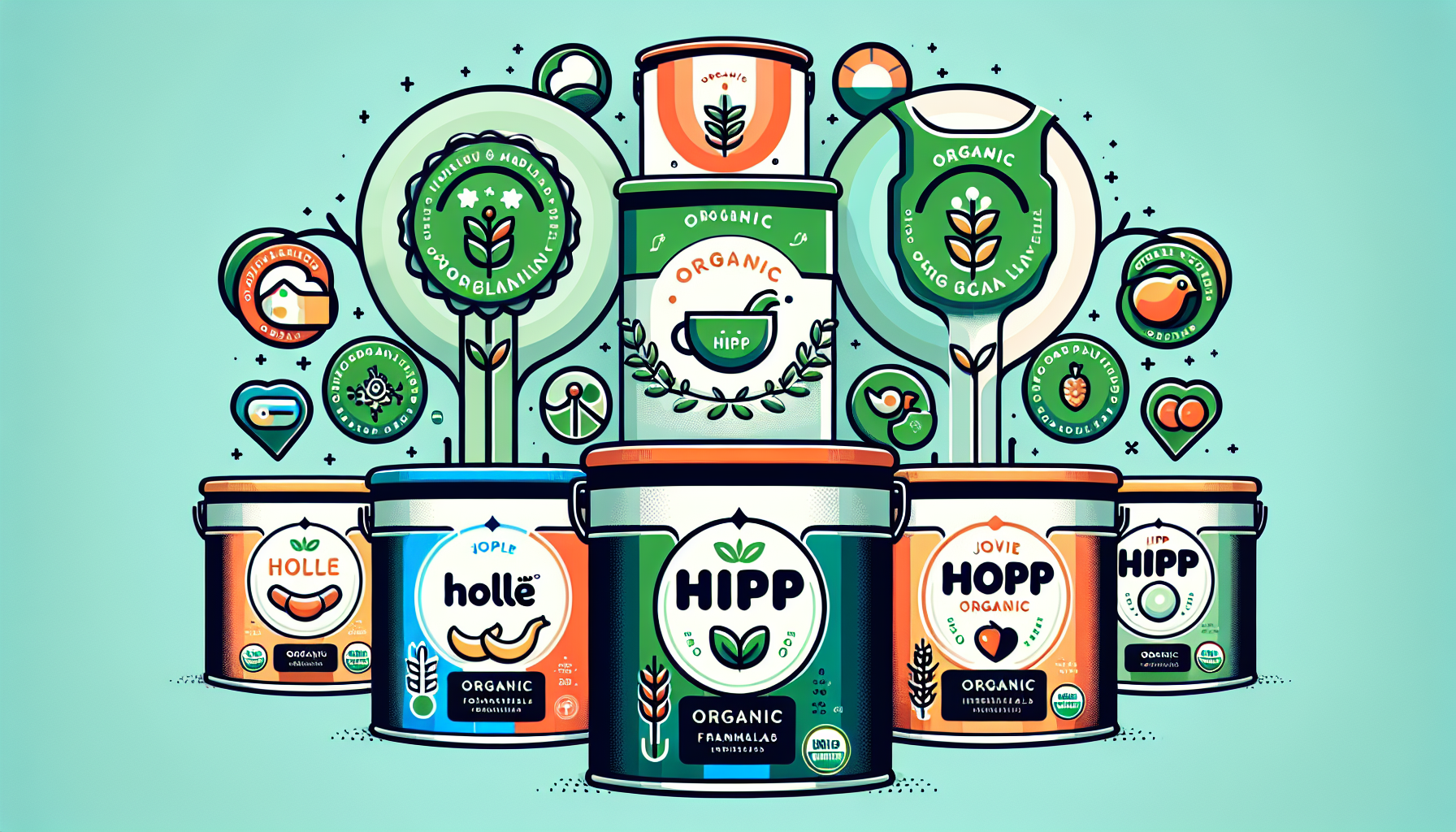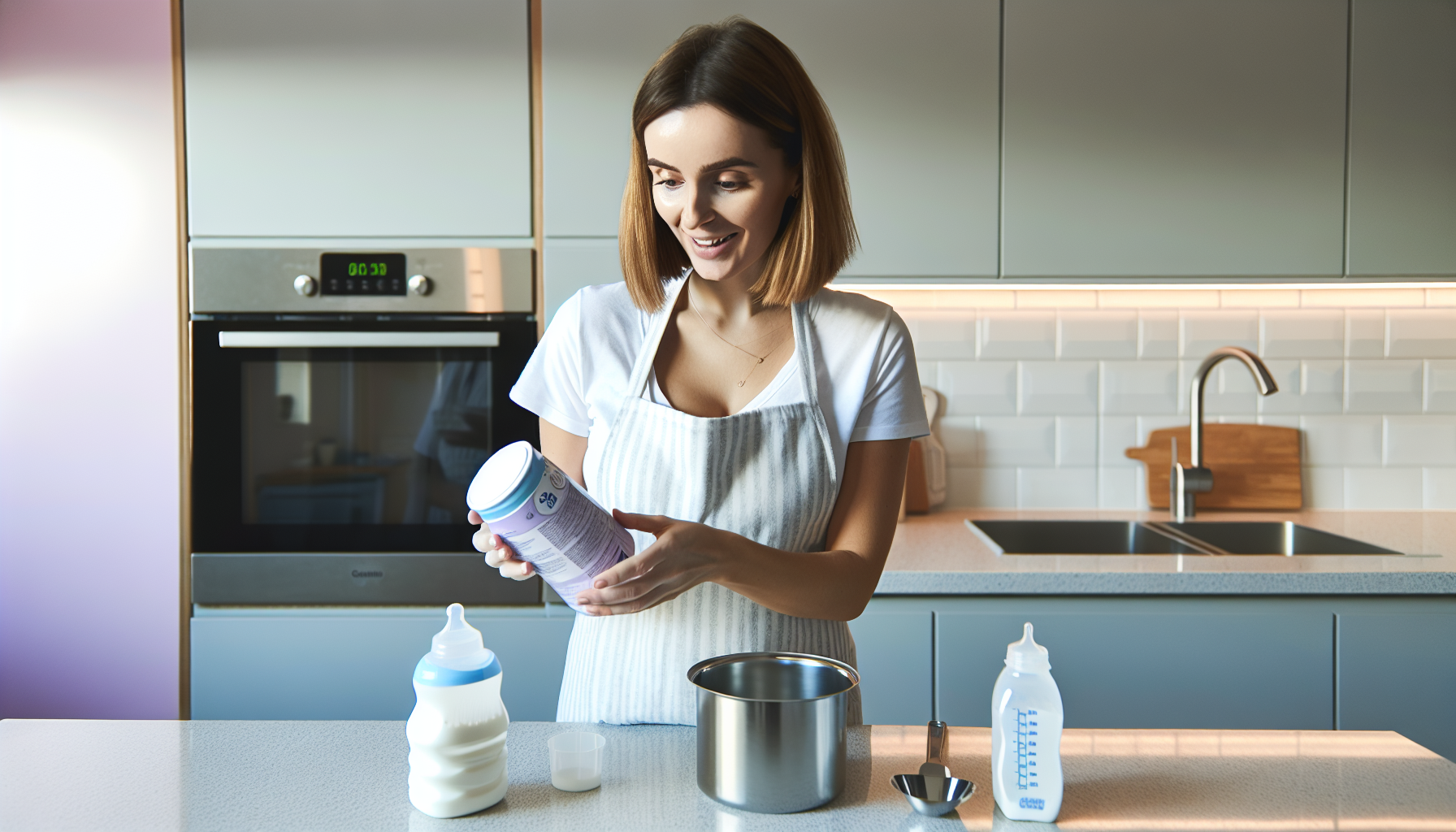If you’re considering organic baby formula for your infant’s diet, you’re likely seeking purity and safety in nutrition. Often, organic options eliminate the concerns associated with conventional formulas, such as pesticide residue and artificial additives. In this article, we explore the advantages and provide insights into leading organic baby formula brands to help you choose the best for your baby’s health and development.
No products found.
Key Takeaways
- Organic baby formulas are preferred for their high-quality ingredients free from pesticides, growth hormones, and GMOs. They come enhanced with essential nutrients and fatty acids, and lack harmful additives like artificial ingredients and heavy metals.
- European brands like Holle, HiPP, and Jovie are renowned for quality and safety, adhering to EU organic farming regulations. These brands offer formulas for different needs including goat milk options, hypoallergenic variants, and formulas free from palm oil and synthetic additives.
- Selecting the proper organic formula involves considering the baby’s developmental stage, dietary needs, and potential food sensitivities or digestive issues. It’s crucial to monitor babies’ reactions during the transition from breast milk to formula and to follow professional advice for a dietary change.
Why Choose Organic Baby Formula?

Selecting the appropriate nutrition for your child might seem challenging. Many parents are now gravitating towards organic baby formulas for their little ones. Why, you ask? Well, these formulas are crafted using the highest quality ingredients sourced from nature itself, such as organic milk from grass-fed cows. This ensures that your baby gets the best possible start in life, nutrition-wise.
But what sets it apart from regular baby formula? Conventional formula often contains pesticide residues, growth hormones, and genetically modified organisms (GMOs) – none of which you’ll find in European organic baby formulas. These formulas, free from GMOs, also promote better digestion and reduce the risk of allergies in infants.
Healthier Ingredients in Organic Formulas
A major benefit of organic baby formulas is their lack of harmful additives. Unlike other formulas, they do not contain artificial ingredients like carrageenan, preservatives, artificial nutrients, colors, or flavors. You also won’t find heavy metals, melamine, soy, gluten, mineral oil, or brown rice syrup in them.
Organic baby formulas have superior ingredient quality compared to non-organic ones. They’re absent of growth hormones and agricultural chemicals, and they don’t carry any synthetic ingredients. Instead, they contain essential nutrients, omega 6 and 3 fatty acids, vitamins D, E, and K, calcium, and iron to aid your baby’s growth and development.
Better Digestion and Reduced Allergies
Organic baby formulas are not just about providing complete nutrition; they also aim to enhance your baby’s digestion. These formulas promote the production of bioactive peptides, thus guaranteeing suitable nutritional intake, akin to the benefits offered by natural breast milk. They may also include ingredients like:
- partially hydrolyzed whey
- omega 3 & 6 LCPs (DHA & ALA)
- oligosaccharides
- prebiotics
- probiotics
These ingredients can aid in digestion.
In addition to better digestion, organic baby formulas can also mitigate the likelihood of allergies in infants. They incorporate probiotic, prebiotic, or synbiotic components that have the potential to promote a healthy gut microbiome and immune system. Hypoallergenic formulas, inclusive of extensively hydrolyzed proteins or free amino acids, help in minimizing allergies.
Top European Organic Baby Formulas: Holle, HiPP, and Jovie

If you’re looking to provide your baby with the highest quality nutrition, some of the best baby formula options are top European organic baby formulas such as Holle, HiPP, and Jovie. These European baby formula brands are renowned for their commitment to quality and safety standards, making them excellent examples of European formulas. They use ingredients like organic skimmed milk (derived from a cow or goat), lactose, and organic whey as sources of carbohydrates in their European organic baby formula. They also include specific nutritional components like organic maltodextrin starch, DHA, and different levels of fats and fatty acids.
But it’s not just about the ingredients. What sets these brands apart is their adherence to the EU’s organic farming regulations, ensuring they are made from certified organic ingredients. They are made from ingredients cultivated without synthetic pesticides and comply with the rigorous safety standards established by the European Community.
Holle: Biodynamic Farming and Goat Milk Options
When it comes to the production of baby food, Holle is a leader in European Demeter-certified biodynamic production. This method prioritizes the health of the soil, plants, animals, and environment via regenerative farming practices. By obtaining organic milk from biodynamic farms, Holle upholds the highest standards of quality and sustainability for their formula.
Another advantage of Holle’s formula is the option of goat milk. It provides improved digestibility because of higher levels of short and medium fatty acids. This makes it milder on the digestive systems of most infants compared to alternative formula options.
Holle’s goat milk formula has been adapted for sensitive babies by reducing its lactose content, making it a suitable choice for babies with sensitivities.
HiPP: Probiotics and Specialized Formulas
HiPP organic baby formula stands out with its incorporation of probiotics and specialized formulas designed for different dietary requirements. This brand uses galacto-oligosaccharides (GOS) as prebiotics and lactobacillus fermentum as probiotics. These probiotics offer advantages for the digestive health of infants, contributing to the maintenance of a healthy gut microbiome and potentially enhancing overall wellness.
HiPP also offers specialized formulas, including HiPP HA (hypoallergenic), HiPP Comfort, and the HiPP Anti Reflux Formula. These formulas incorporate prebiotics and probiotics to support improved digestion and gut health.
Jovie: Newcomer with High-Quality Standards
Jovie is a newcomer in the organic baby formula market, but it already stands out with its high-quality standards and emphasis on organic ingredients. It uses organic full fat goat milk as the primary component and excludes synthetics like palm oil, coconut oil, and maltodextrin.
This brand distinguishes itself by utilizing organic whole goat milk and lactose, enriched with AA (arachidonic acid), and obtaining stringent EU organic certification. It guarantees the absence of:
- chemicals
- preservatives
- added sugars
- soy
- corn syrup
- palm oil
In its infant formulas, the company emphasizes its dedication to providing the highest quality nutrition for infants.
The production of Jovie baby formula takes place in The Netherlands, in compliance with the rigorous quality and safety standards set for organic products in the country.
Selecting the Right Organic Formula for Your Baby’s Needs

Selecting the right baby formula entails more than merely choosing an organic formula brand. You need to consider the various stages of baby development, your baby’s nutritional requirements, and their digestive system’s compatibility with the formula.
It’s also significant to consider common infant concerns. If your baby experiences issues like colic, constipation, or reflux, you’ll need to consider specialized formulas that can relieve these problems.
Age-Appropriate Stages: From Birth to Toddlerhood
The nutritional needs of babies change as they grow. Here are the general guidelines:
- Newborns consume small amounts of food every two to three hours.
- Infants require approximately 40-50 calories per pound of body weight per day.
- Toddlers need 1,000-1,400 calories daily in addition to a well-balanced diet.
To cater to the evolving requirements of developing infants, baby formula is categorized into stages 1, 2, and 3. Stage 1 is formulated to be more watery for newborns, stage 2 is designed for babies aged 3 to 6 months, and stage 3 is intended for those aged 6 to 12 months.
Dietary Requirements: Lactose-Free, Soy-Free, and Hypoallergenic Options
When it comes to dietary needs, not every baby is the same. Some babies may require lactose-free or soy-free formulas due to allergies or sensitivities. Lactose-free baby formulas provide a solution for digestive problems in infants with lactose intolerance, including symptoms like gas, bloating, and diarrhea.
Conversely, some infants may need soy-free formulas. Soy in baby formulas can:
- Interfere with sexual and immune system development
- Elevate the risk of osteopenia
- Raise concerns about male reproductive toxicity
- Cause hormonal imbalance
Addressing Common Infant Issues: Colic, Constipation, and Reflux
Addressing common infant issues is a crucial aspect of choosing the right formula. For infants suffering from constipation, HiPP Comfort Milk and HiPP Dutch Combiotic formula are specific formulations designed to ease this problem.
For babies suffering from colic, ingredients like:
- probiotics
- Aptamil Comfort Formula
- Alfamino
- iron-fortified formula
- HiPP’s Hypoallergenic formula
can alleviate symptoms. These formulas are free from cow’s milk, such as natural or organic goat’s milk formulas.
How to Make the Switch from Breastfeeding to Organic Baby Formula

Transitioning from breastfeeding to organic baby formula should be a gradual process. It’s crucial to allow your baby enough time to adjust. Start by introducing a bottle of formula approximately one to two hours after breastfeeding.
During this transition, monitor your baby’s reaction to the new formula. Watch for signs of discomfort such as excessive crying, fussiness, or alterations in bowel movements. If your baby is not adapting well, it may be necessary to seek professional advice.
Gradual Transition: Mixing Breast Milk and Formula
When starting the transition from breast milk to formula, it’s recommended to use a ratio of ¾ breast milk to ¼ formula for the initial 4 days. The proper method for effectively and safely mixing breast milk and formula is to first mix the formula according to the manufacturer’s instructions, and then add a portion of breast milk to the bottle.
While mixing breast milk and formula can be beneficial, it’s important to be cautious as it may result in digestive issues for certain babies. To minimize these risks, you should meticulously adhere to the preparation instructions for the formula to prevent bacterial contamination, and discard any remaining bottles of mixed milk.
Monitoring Your Baby’s Reaction
It’s vital to closely monitor your baby’s response to a new formula. Observing their behavior and overall well-being, while being attentive to signs of discomfort, can help you gauge their reaction.
Typical indications of formula intolerance include:
- diarrhea
- vomiting
- the baby pulling their legs up toward their belly due to discomfort
- feeding difficulties
If you notice any of these signs, it may be necessary to adjust the formula or seek medical advice.
Seeking Professional Advice
Before initiating the transition, it’s necessary to consult with professionals. Pediatricians can offer helpful guidance in establishing suitable weaning practices, choosing the right organic formula, and ensuring a smooth transition during your baby’s dietary change.
Professional advice should be sought for personalized guidance on your baby’s nutritional needs. A pediatric nutritionist can provide tailored advice that caters specifically to your baby’s health and dietary requirements.
The Importance of Proper Formula Preparation and Storage

Correct formula preparation and storage are critical to preserve the quality and safety of organic baby formula. It’s advisable to use the formula within one hour after the beginning of feeding and to refrain from storing leftovers.
Improper storage of organic baby formula can lead to contamination or spoilage, which can have a detrimental impact on its quality and safety. Therefore, it’s crucial to follow the manufacturer’s storage instructions to ensure the product remains safe for your baby.
Following Manufacturer Instructions
When preparing baby formula, it’s extremely important to adhere to the manufacturer’s instructions. This guarantees the correct and safe preparation of the formula, thereby ensuring the provision of appropriate nutrition for the baby.
Different brands have different preparation methods. Whether it’s Holle, HiPP, or Jovie, it’s crucial to follow the preparation instructions provided by the manufacturer to ensure that your baby gets the best nutrition.
Safe Storage Practices
The secure storage of organic baby formula holds equal significance as its preparation. Unopened formula should be stored in a cool and dry indoor location. Once opened, it should be kept in a cool and dry place with the lid securely closed to preserve freshness and avoid contamination.
The shelf life of powdered formulas can vary, but in general, they maintain quality for more than six months when unopened. Once opened, formulas should be used within a specified time to ensure quality and safety.
Summary
In conclusion, providing your baby with the best nutrition is a top priority. Organic baby formulas offer a healthier alternative to conventional formulas, with high-quality ingredients, better digestion, and fewer allergies. Brands like Holle, HiPP, and Jovie uphold high standards of quality and safety, with options for different age stages and dietary needs. Transitioning from breastfeeding to formula should be gradual and closely monitored. And, remember, proper formula preparation and storage are crucial for maintaining its quality and safety.
Frequently Asked Questions
What is the best organic healthy baby formula?
The best organic healthy baby formula is Happy Baby Organics Infant Formula because it has 4 times more prebiotics than most other organic milk-based formulas, including fibers that mimic the function of the prebiotics found naturally in breast milk.
What baby formula is closest to breast milk?
Similac 360 Total Care Infant Formula is often considered the closest formula to breast milk, featuring a blend of nutrients found in breast milk, such as DHA, lutein, and vitamin E. Enfamil’s Enspire is also a strong contender, as it includes proteins found in colostrum, like lactoferrin, making it very similar to breast milk.
How important is organic baby formula?
Choosing organic baby formula can be important as it provides essential nutrients like Omega 6 and 3 fatty acids, prebiotics, and probiotics, while also reducing potential exposure to pesticides and other chemicals, ultimately benefiting your baby’s health and development.
What is the difference between organic and regular baby formula?
The main difference between organic and regular baby formula is that organic formula is free of pesticide residue, growth hormones, GMOs, synthetic chemicals, preservatives, and potentially harmful substances. It must be certified organic with at least 95% of the ingredients meeting organic requirements.
What are some well-known European organic baby formula brands?
Holle, HiPP, and Jovie are some well-known organic baby formula brands in Europe that you may consider exploring for your child’s needs.